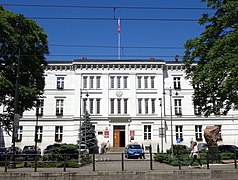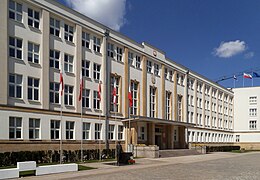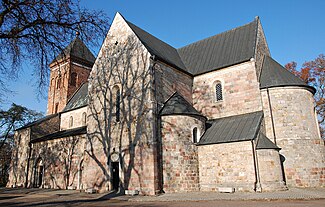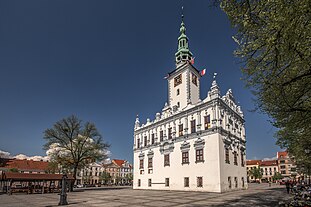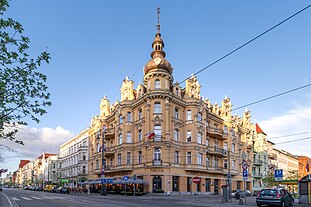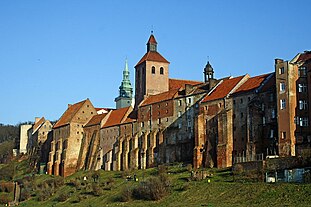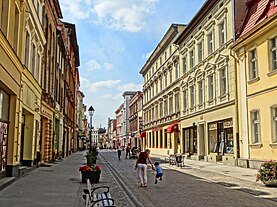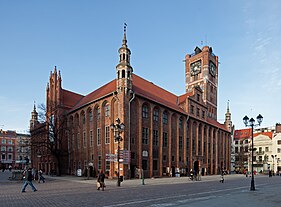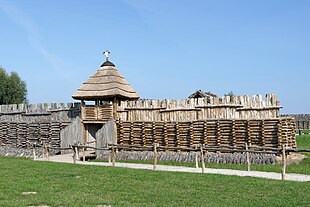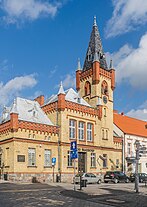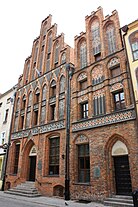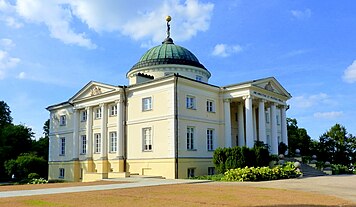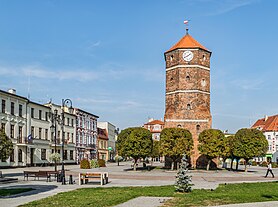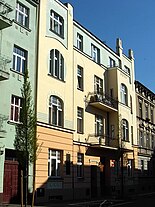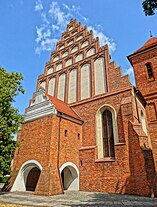Kuyavian–Pomeranian Voivodeship
Kuyavian–Pomeranian Voivodeship (Polish: województwo kujawsko-pomorskie [vɔjɛˈvut͡stfɔ kuˈjafskɔ pɔˈmɔrskʲɛ] ) is one of Poland's 16 voivodeships (provinces).
It was created on 1 January 1999 and is situated in mid-northern Poland, on the boundary between the two historic regions from which it takes its name: Kuyavia (Polish: Kujawy) and Pomerania (Polish: Pomorze).
Its two chief cities, serving as the province's joint capitals, are Bydgoszcz and Toruń.
History
[edit]
The Kuyavian–Pomeranian Voivodeship was created on 1 January 1999, as a result of the Polish local government reforms adopted in 1998. It consisted of territory from the former Bydgoszcz, Toruń and Włocławek Voivodeships.
The area now known as Kuyavia-Pomerania was previously divided between the region of Kuyavia, Dobrzyń Land, Pomerania (including Chełmno Land and Kociewie), and Greater Poland (including Pałuki and Krajna). Of the two principal cities of today's Kuyavian–Pomeranian voivodeship, one (Bydgoszcz) was historically located in Kuyavia, while the other (Toruń) was an important town of Chełmno Land.
Administration and territory
[edit]The functions of regional capital are split between Bydgoszcz and Toruń. Bydgoszcz serves as the seat of the centrally appointed governor or voivode (Polish: wojewoda), while Toruń is the seat of the elected Regional Assembly (sejmik), and of the executive elected by that assembly, headed by the voivodeship marshal (marszałek województwa).
The Kuyavian–Pomeranian Voivodeship is bordered by five other voivodeships. These are Pomeranian Voivodeship to the north, Warmian–Masurian Voivodeship to the north-east, Masovian Voivodeship to the east, Łódź Voivodeship across a short boundary to the south, and Greater Poland Voivodeship to the south and west.
Cities and towns
[edit]





| Year | Pop. | ±% |
|---|---|---|
| 1988 | 2,044,049 | — |
| 2002 | 2,069,321 | +1.2% |
| 2011 | 2,097,635 | +1.4% |
| 2021 | 2,027,261 | −3.4% |
| Source: [3] | ||
The voivodeship contains 5 cities and 47 towns. These are listed below in descending order of population (according to official figures for 2019[4]):
- Bydgoszcz (349,021)
- Toruń (201,798)
- Włocławek (110,287)
- Grudziądz (94,732)
- Inowrocław (72,786)
Towns:
- Brodnica (28,788)
- Świecie (25,723)
- Chełmno (19,605)
- Nakło nad Notecią (18,281)
- Rypin (16,227)
- Solec Kujawski (15,652)
- Chełmża (14,503)
- Lipno (14,399)
- Żnin (13,864)
- Tuchola (13,621)
- Wąbrzeźno (13,570)
- Golub-Dobrzyń (12,563)
- Aleksandrów Kujawski (12,147)
- Mogilno (11,836)
- Koronowo (11,162)
- Ciechocinek (10,590)
- Szubin (9,556)
- Sępólno Krajeńskie (9,091)
- Kruszwica (8,809)
- Janikowo (8,745)
- Barcin (7,408)
- Gniewkowo (7,110)
- Więcbork (5,950)
- Nowe (5,827)
- Pakość (5,706)
- Strzelno (5,631)
- Radziejów (5,578)
- Kcynia (4,657)
- Brześć Kujawski (4,642)
- Łabiszyn (4,472)
- Piotrków Kujawski (4,456)
- Mrocza (4,350)
- Kowalewo Pomorskie (4,130)
- Janowiec Wielkopolski (3,953)
- Jabłonowo Pomorskie (3,754)
- Skępe (3,620)
- Kowal (3,484)
- Łasin (3,254)
- Lubraniec (2,999)
- Izbica Kujawska (2,609)
- Kamień Krajeński (2,390)
- Dobrzyń nad Wisłą (2,127)
- Chodecz (1,894)
- Nieszawa (1,853)
- Radzyń Chełmiński (1,847)
- Lubień Kujawski (1,391)
- Górzno
- Kikół
- Pruszcz
- Gąsawa
- Bobrowniki
Economy
[edit]The Gross domestic product (GDP) of the province was 21.8 billion euros in 2018, accounting for 4.4% of Polish economic output. GDP per capita adjusted for purchasing power was 17,300 euros or 57% of the EU27 average in the same year. The GDP per employee was 64% of the EU average.[5]
Transportation
[edit]Transportation infrastructure is of critical importance to the voivodeship's economy. Kuyavia-Pomerania is a major node in the Polish transportation system. Railway lines from the South and East pass through Bydgoszcz to connect to the major ports on the Baltic Sea. In addition to this, Bydgoszcz is home to the rolling stock manufacturer PESA SA, Poland's largest and most modern producer of railway and tram products. The province's sole international airport, Ignacy Jan Paderewski Airport, is located in Bydgoszcz and has connections to a number of European destinations as well as Warsaw, which are all operated by either Irish carrier Ryanair or LOT Polish Airlines.
The main railway stations of the province are Bydgoszcz main station and Toruń main station; both stations are served by fast PKP Intercity trains which connect them with the capital Warsaw, as well as other major Polish cities. In addition to these fast express services, inter-regional trains are operated by the firm Przewozy Regionalne, while domestic rail transportation within the voivodeship is provided by Arriva RP, a private firm to which the provincial government subcontracted the provision of rail transport.
The A1 and S5 highways pass through the province, with the S10 also under construction.
All major towns of the province have municipal transportation companies operating buses, while Bydgoszcz, Toruń and Grudziądz also have extensive tram systems.
Politics
[edit]The Kuyavian-Pomeranian voivodeship's government is headed by the province's voivode (governor) who is appointed by the Polish Prime Minister. The voivode is then assisted in performing his duties by the voivodeship's marshal, who is the appointed speaker for the voivodeship's executive and is elected by the sejmik (provincial assembly). The current voivode of Kuyavia-Pomerania is Ewa Monika Mes, and the present marshal is Piotr Całbecki.
The Sejmik of Kuyavia-Pomerania consists of 33 members.
| Party | Votes | % | Total seats held |
|---|---|---|---|
| Civic Platform (PO) | 218,004 | 33.81 | 16 |
| Law and Justice (PiS) | 114,557 | 17.77 | 6 |
| Democratic Left Alliance (SLD) | 111,885 | 17.35 | 6 |
| Polish People's Party (PSL) | 93,445 | 14.49 | 5 |
| Others | 106,877 | 16.58 | 0 |
| Total | 644,768 | 100.00 | 33 |
| |||
Governors
[edit]| Name | Period |
|---|---|
| Józef Rogacki | 1 January 1999 – 21 October 2001 |
| Romuald Kosieniak | 21 October 2001 – 26 January 2006 |
| Józef Ramlau | 26 January 2006 – 24 July 2006 |
| Marzenna Drab (acting) | 24 July 2006 – 7 November 2006 |
| Zbigniew Hoffmann | 7 November 2006 – 29 November 2007 |
| Rafał Bruski | 29 November 2007 – 13 December 2010 |
| Ewa Mes | 14 December 2010–present |
Administrative division
[edit]The Kuyavian-Pomeranian Voivodeship is divided into 23 counties (powiats): 4 city counties and 19 land counties. These are further divided into 144 gminas.
The counties are listed in the following table (ordering within categories is by decreasing population).
| English and Polish names |
Area (km2) |
Population (2019)[4] |
Seat | Other towns | Total gminas |
| City counties | |||||
| Bydgoszcz | 175 | 349,021 | 1 | ||
| Toruń | 116 | 201,798 | 1 | ||
| Włocławek | 84 | 110,287 | 1 | ||
| Grudziądz | 58 | 94,732 | 1 | ||
| Land counties | |||||
| Inowrocław County powiat inowrocławski |
1,225 | 160,216 | Inowrocław | Kruszwica, Janikowo, Gniewkowo, Pakość | 9 |
| Bydgoszcz County powiat bydgoski |
1,395 | 118,041 | Bydgoszcz * | Solec Kujawski, Koronowo | 8 |
| Toruń County powiat toruński |
1,230 | 107,641 | Toruń * | Chełmża | 9 |
| Świecie County powiat świecki |
1,473 | 99,154 | Świecie | Nowe, Pruszcz | 11 |
| Nakło County powiat nakielski |
1,120 | 86,449 | Nakło nad Notecią | Szubin, Kcynia, Mrocza | 5 |
| Włocławek County powiat włocławski |
1,472 | 86,131 | Włocławek * | Brześć Kujawski, Kowal, Lubraniec, Izbica Kujawska, Chodecz, Lubień Kujawski | 13 |
| Brodnica County powiat brodnicki |
1,039 | 78,935 | Brodnica | Jabłonowo Pomorskie, Górzno | 10 |
| Żnin County powiat żniński |
985 | 70,234 | Żnin | Barcin, Łabiszyn, Janowiec Wielkopolski, Gąsawa | 6 |
| Lipno County powiat lipnowski |
1,016 | 65,869 | Lipno | Skępe, Dobrzyń nad Wisłą, Kikół, Bobrowniki | 9 |
| Aleksandrów County powiat aleksandrowski |
476 | 55,150 | Aleksandrów Kujawski | Ciechocinek, Nieszawa | 9 |
| Chełmno County powiat chełmiński |
528 | 52,018 | Chełmno | 7 | |
| Tuchola County powiat tucholski |
1,075 | 48,329 | Tuchola | 6 | |
| Mogilno County powiat mogileński |
676 | 45,756 | Mogilno | Strzelno | 4 |
| Golub-Dobrzyń County powiat golubsko-dobrzyński |
613 | 45,059 | Golub-Dobrzyń | Kowalewo Pomorskie | 6 |
| Rypin County powiat rypiński |
587 | 43,618 | Rypin | 6 | |
| Sępólno County powiat sępoleński |
791 | 41,055 | Sępólno Krajeńskie | Więcbork, Kamień Krajeński | 4 |
| Radziejów County powiat radziejowski |
607 | 40,546 | Radziejów | Piotrków Kujawski | 7 |
| Grudziądz County powiat grudziądzki |
728 | 40,181 | Grudziądz * | Łasin, Radzyń Chełmiński | 6 |
| Wąbrzeźno County powiat wąbrzeski |
501 | 34,297 | Wąbrzeźno | 5 | |
| * seat not part of the county | |||||
Protected areas
[edit]
Protected areas in Kuyavian-Pomeranian Voivodeship include the nine Landscape Parks listed below.
- Brodnica Landscape Park (partly in Warmian-Masurian Voivodeship)
- Chełmno Landscape Park
- Gopło Landscape Park
- Górzno-Lidzbark Landscape Park (partly in Masovian and Warmian-Masurian Voivodeships)
- Gostynin-Włocławek Landscape Park (partly in Masovian Voivodeship)
- Krajna Landscape Park
- Tuchola Landscape Park (partly in Pomeranian Voivodeship)
- Vistula Landscape Park
- Wda Landscape Park
Sights and tourism
[edit]
There are eight Historic Monuments of Poland and one World Heritage Site in the voivodeship:
- Medieval Town of Toruń (listed as both)[7]
- Old Town of Chełmno[8]
- Biskupin archeological reserve[9]
- Graduation towers, saline and spa parks of Ciechocinek[10]
- Grudziądz Granaries[11]
- Lubostroń Palace and Park Complex[12]
- Norbertine monastery complex with the Romanesque Saint Procopius Church and the Romanesque-Gothic-Baroque Holy Trinity Church in Strzelno[13]
- Włocławek Cathedral[14]
The region is rich in historic architecture ranging from Romanesque and Gothic architecture to Renaissance, Baroque and Art Nouveau. Other preserved historic old towns include Bydgoszcz, Grudziądz and Brodnica. There are also numerous castles, including Dybów, Golub, Radzyń Chełmiński, Świecie, Zamek Bierzgłowski, preserved castle towers, including Brodnica and Kruszwica, and palaces, including Jabłonowo Pomorskie, Ostromecko, Wąpielsk, Żołędowo. The Dybów Castle was the place where in 1454 King Casimir IV Jagiellon issued the famous Statutes of Nieszawa, covering a set of privileges for the Polish nobility; an event that is regarded as the birth of the noble democracy in Poland, which lasted until the late-18th-century Partitions of Poland. The manor in Szafarnia was a place of stay for Fryderyk Chopin during his 1824 and 1825 summer vacations, and contains a museum dedicated to the composer.
Włocławek, Toruń and Bydgoszcz contain preserved Gothic cathedrals. Locations of historic monastaries include Chełmno, Grudziądz, Mogilno, Rywałd and Skępe. In Gąsawa, there is the 17th-century Saint Nicolas Church with a unique collection of multi-layered mural paintings, dating back several centuries.

There are three spa towns: Ciechocinek, Inowrocław and Wieniec-Zdrój.
Major museums and art galleries are located in Bydgoszcz, Toruń and Włocławek, including the Leon Wyczółkowski Regional Museum in Bydgoszcz, District Museum in Toruń and Museum of Kuyavia and Dobrzyń Land in Włocławek. The more unique museums include:
- Copernicus House in Toruń, museum dedicated to Nicolaus Copernicus
- European Museum of Money at the former Polish Royal Mint in Bydgoszcz
- Museum of Toruń Gingerbread in Toruń
- Museum of Far Eastern Art in the Under the Star Tenement House in Toruń
- Andrzej Szwalbe Collection of Historical Pianos at the palace in Ostromecko, one of two largest such collections in Poland
- Narrow Gauge Railway Museum in Wenecja
- Exploseum in Bydgoszcz, operated at the site of a former Nazi German arms factory.

There are numerous World War II memorials in the province, including a memorial at the site of the former Potulice concentration camp, memorials at the sites of Nazi massacres of Poles, including the largest massacres at Mniszek, Gniewkowo, Klamry, Łopatki and Fordon, and memorials to Allied prisoners of war held by Nazi Germany in the region at the sites of the former Stalag XX-A, Oflag XXI-B and Oflag 64 POW camps in Toruń and Szubin.
Other notable sights include the Bydgoszcz Canal, connecting Bydgoszcz and Nakło nad Notecią, the Battle of Koronowo (1410) Monument, and monuments do distinguished people from the region, including cryptologist Marian Rejewski (birthplace and monument in Bydgoszcz), writer Jan Kasprowicz (childhood home and monument in Inowrocław), and surgeon Ludwik Rydygier, the first surgeon in the world to carry out a peptic ulcer resection (former clinic and monument in Chełmno).
Sports
[edit]


Motorcycle speedway, basketball and volleyball enjoy the largest following in the province. The KS Toruń and Polonia Bydgoszcz clubs are among the most accomplished speedway clubs in the country and contest the Pomeranian-Kuyavian Derby, one of the fiercest speedway rivalries.
| Club | Sport | League | Trophies |
|---|---|---|---|
| Polonia Bydgoszcz | Speedway | 1 Liga | 7 Polish Championships |
| KS Toruń | Speedway | Ekstraliga | 4 Polish Championships |
| GKM Grudziądz | Speedway | Ekstraliga | 0 |
| Anwil Włocławek | Basketball (men's) | Polish Basketball League | 3 Polish Championships (2003, 2018, 2019) 4 Polish Cups (1995, 1996, 2007, 2020) 1 FIBA Europe Cup (2023) |
| Twarde Pierniki Toruń | Basketball (men's) | Polish Basketball League | 1 Polish Cup (2018) |
| Astoria Bydgoszcz | Basketball (men's) | I Liga | 0 |
| Noteć Inowrocław | Basketball (men's) | I Liga | 0 |
| Basket 25 Bydgoszcz | Basketball (women's) | Basket Liga Kobiet | 1 Polish Cup (2018) |
| Katarzynki Toruń | Basketball (women's) | Basket Liga Kobiet | 0 |
| KS Toruń HSA | Ice hockey | Polska Hokej Liga | 1 Polish Cup (2005) |
| BKS Visła Bydgoszcz | Volleyball (men's) | I liga | 0 |
| Anioły Toruń | Volleyball (men's) | I liga | 0 |
| Pałac Bydgoszcz | Volleyball (women's) | Tauron Liga | 1 Polish Championship (1993) 3 Polish Cups (1992, 2001, 2005) |
| Sokół Mogilno | Volleyball (women's) | I liga | 0 |
| Zawisza Bydgoszcz | Football (men's) | III liga | 1 Polish Cup (2014) |
| Olimpia Grudziądz | Football (men's) | II liga | 0 |
| Elana Toruń | Football (men's) | III liga | 0 |
| KKP Bydgoszcz | Football (women's) | I liga | 0 |
| FC Toruń | Futsal (men's) | Ekstraklasa | 0 |
| Pomorzanin Toruń | Field hockey (men's) | Superliga | 3 Polish Championships (1990, 2014, 2023) |
| Bydgoszcz Archers | American football | Polish Football League | 1 Polish Championship (2021) |
Since the establishment of the province, several major international sports competitions were co-hosted by the province, including the EuroBasket 2009, 2009 Women's European Volleyball Championship, 2010 IAAF World Cross Country Championships, EuroBasket Women 2011, 2013 IAAF World Cross Country Championships, 2014 FIVB Volleyball Men's World Championship, and 2019 FIFA U-20 World Cup.
Curiosities
[edit]- Brześć Kujawski, Bydgoszcz, Dobrzyń nad Wisłą, Gniewkowo and Inowrocław were medieval ducal seats of the Piast dynasty.
- Bydgoszcz and Toruń, although not capitals of Poland, hosted sessions of the Polish Parliament. Bydgoszcz in 1520, Toruń in 1576 and 1626.[15]
- Toruń served as the temporary Polish capital in 1809.[16]
- Medieval municipal rights modelled after Chełmno, known as Chełmno rights, became the basis of municipal form of government for various cities and towns of the region and beyond, including Warsaw.
- The Kuyavian-Pomeranian Voivodeship is one of four first-level administrative divisions containing the name of the historic region of Pomerania, the other being the Pomeranian Voivodeship and West Pomeranian Voivodeship in Poland, and Mecklenburg-Vorpommern in Germany.
Gallery
[edit]-
Market Square in Chełmno
-
Bydgoszcz Old Town
-
Old Town Hall in Toruń
-
Town hall in Świecie
-
Nicolaus Copernicus House in Toruń
-
Market Square in Żnin
-
Birthplace of cryptologist Marian Rejewski in Bydgoszcz
See also
[edit]Notes
[edit]- ^ "EU regions by GDP, Eurostat". Retrieved 18 September 2023.
- ^ "Sub-national HDI – Subnational HDI – Global Data Lab". globaldatalab.org. Radboud University Nijmegen. Retrieved 2021-12-13.
- ^ "Statistics Poland - National Censuses".
- ^ a b GUS. "Population. Size and structure and vital statistics in Poland by territorial division in 2019. As of 30th June". stat.gov.pl. Archived from the original on 2021-04-19. Retrieved 2020-09-11.
- ^ "Regional GDP per capita ranged from 30% to 263% of the EU average in 2018". Eurostat.
- ^ "Kuyavian-Pomeranian Regional Assembly elections". State Electoral Commission. Retrieved 2011-05-28.
- ^ Zarządzenie Prezydenta Rzeczypospolitej Polskiej z dnia 8 września 1994 r. w sprawie uznania za pomnik historii., M.P., 1994, vol. 50, No. 422
- ^ Rozporządzenie Prezydenta Rzeczypospolitej Polskiej z dnia 13 kwietnia 2005 r. w sprawie uznania za pomnik historii, Dz. U., 2005, vol. 64, No. 568
- ^ Zarządzenie Prezydenta Rzeczypospolitej Polskiej z dnia 8 września 1994 r. w sprawie uznania za pomnik historii., M.P., 1994, vol. 50, No. 412
- ^ Rozporządzenie Prezydenta Rzeczypospolitej Polskiej z dnia 22 listopada 2017 r. w sprawie uznania za pomnik historii "Ciechocinek - zespół tężni i warzelni soli wraz z parkami Tężniowym i Zdrojowym", Dz. U., 2017, No. 2276
- ^ Rozporządzenie Prezydenta Rzeczypospolitej Polskiej z dnia 22 listopada 2017 r. w sprawie uznania za pomnik historii "Grudziądz - zespół zabytkowych spichlerzy wraz z panoramą od strony Wisły", Dz. U., 2017, No. 2271
- ^ Rozporządzenie Prezydenta Rzeczypospolitej Polskiej z dnia 15 listopada 2023 r. w sprawie uznania za pomnik historii "Lubostroń - zespół pałacowo-parkowy", Dz. U., 2023, No. 2507
- ^ Rozporządzenie Prezydenta Rzeczypospolitej Polskiej z dnia 20 kwietnia 2018 r. w sprawie uznania za pomnik historii "Strzelno - zespół dawnego klasztoru Norbertanek", Dz. U., 2018, No. 981
- ^ Rozporządzenie Prezydenta Rzeczypospolitej Polskiej z dnia 10 grudnia 2018 r. w sprawie uznania za pomnik historii "Włocławek - katedra pod wezwaniem Wniebowzięcia Najświętszej Maryi Panny", Dz. U., 2018, No. 2421
- ^ Konopczyński, Władysław (1948). Chronologia sejmów polskich 1493–1793 (in Polish). Kraków: Polska Akademia Umiejętności. pp. 135, 142, 148.
- ^ "Toruń stolicą Polski? Przez trzy tygodnie". Interia Nowa Historia (in Polish). Retrieved 27 May 2024.






